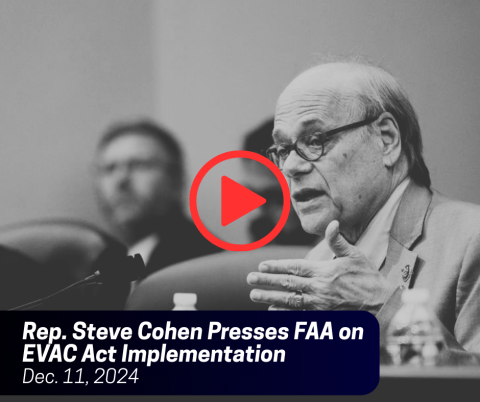The EVAC Act — Making Air Travel Safer When Seconds Count
Authored by Congressman Steve Cohen (TN-9), Ranking Member of the House Aviation Subcommittee, the Emergency Vacating of Aircraft Cabin (EVAC) Act is a landmark aviation safety law that requires the Federal Aviation Administration (FAA) to update aircraft evacuation standards based on real-world conditions.
It ensures that evacuation tests reflect the realities passengers face today—from tighter seating and overhead bags to elderly, disabled, and child passengers—so lives can be saved when seconds matter.
Why It Matters
The FAA’s current evacuation standards mandate that all passengers must be capable of evacuating an aircraft within 90 seconds. However, these standards were previously based on simulations that didn’t reflect real emergencies or real passengers. Tests were run under idealized conditions: no luggage, no children, no elderly passengers, no pets or service animals, and no panic. In a real crisis—like a fire, emergency landing, or water evacuation—those conditions don’t exist.
In a real emergency, lives will depend on accurate, realistic testing. The EVAC Act ensures that the FAA does its job to protect passengers.
What the Bill Does
Now that the EVAC Act has been signed into law, it will require the FAA to conduct a comprehensive study on aircraft evacuation and empanel a committee of experts and stakeholders—including representatives of the disability community, senior citizens (people aged 60 and over) and pediatricians—to evaluate gaps in current evacuation standards and operating procedures and make recommendations. It will require the FAA to initiate a rulemaking on any recommendations the FAA Administrator deems appropriate and require the FAA to report study findings, committee recommendations and the Administrator’s plan to implement any such recommendations.
The FAA study on evacuations would include:
- Prospective risk analysis, not just evaluation of past incidents.
- Recommendations for how to improve evacuation regulations and demonstrations to ensure they account for passengers with disabilities, including those who use wheelchairs or other mobility assistive devices.
- Research on risk posed by carry-on bags recommended by NTSB.
- Whether each new generation of aircraft should be required to undergo full-scale in-person evacuation testing.
- An assessment of the following evacuation conditions:
- Presence of passengers of different ages, including infants, children and senior citizens (people aged 60 and over);
- Presence of passengers with disabilities;
- Presence of passengers who have difficulty speaking or are non-verbal;
- Presence of passengers who do not speak English;
- Presence of carry-on luggage and personal items such as a purse, briefcase or backpack
- Seat size and spacing;
- Passenger load; and
- Presence of service animals.
Legislative History of the EVAC Act
As Ranking Member of the House Aviation Subcommittee, Rep. Cohen has long prioritized safety for the flying public. In 2018, he authored the Seat Egress in Air Travel (SEAT) Act, which became law and directed the FAA to study how seat size and pitch can affect emergency evacuations.
The results of those studies were alarming: the FAA’s simulations ignored critical real-world factors like carry-on baggage, passengers with disabilities, and overcrowded cabins. Those findings led Rep. Cohen to introduce the EVAC Act to ensure the FAA’s standards are based on reality.
- December 8, 2022— Following alarming FAA evacuation tests that ignored real world conditions, Rep. Cohen introduces the Emergency Vacating of Aircraft Cabin (EVAC) Act to the 117th Congress to require updated, realistic evacuation standards that prioritize passenger safety.
- The bill was referred to the House Transportation & Infrastructure Committee and to the Subcommittee on Aviation. With only a short time remaining in the 117th Congress, however, it did not advance for a vote.
- May 31, 2023 — Congressman Cohen re-introduces the EVAC Act in the 118th Congress. An identical companion bill was introduced in the Senate by Senator and pilot Tammy Duckworth (D-Illinois) – a member of the Committee on Commerce, Science and Transportation (CST) and Chair of the Subcommittee on Aviation Safety, Operations and Innovation and Senator Tammy Baldwin (D-Wisconsin).
- June 9, 2023— Rep. Cohen applauds the bipartisan introduction of the FAA Reauthorization Act of 2024. After working to build consensus among his colleagues, the reauthorization bill was introduced with key provisions from Rep. Cohen’s EVAC Act.
- January 29, 2024— After 367 passengers took 18 minutes to evacuate Japan Airlines Flight 516—far longer than the FAA’s 90-second standard—Rep. Cohen writes to FAA Administrator Whitaker urging immediate reevaluation of evacuation rules. He cites the incident as further evidence of the need for his EVAC Act.
- May 9, 2024 — The Senate overwhelmingly passes the bipartisan FAA Reauthorization Act of 2024, advancing comprehensive aviation safety reforms towards final enactment.
- May 15, 2024— The House passes the bipartisan FAA Reauthorization Act of 2024 in a 387-26 vote. The final bill included key provisions from Rep. Cohen’s EVAC Act requiring the FAA to study evacuation gaps and begin rulemaking to modernize outdated safety standards.
- May 16, 2024 — President Biden signs the FAA Reauthorization Act of 2024 into law, enacting Rep. Cohen’s EVACT Act provisions to mandate FAA review and rulemaking on realistic aircraft evaluation procedures.
Implementation Status
The EVAC Act is now law, and the FAA is in the process of carrying out the study as mandated by the statute. Rep. Cohen continues to oversee implementation to ensure the agency meets its responsibility to protect airline passengers and follows through with the law’s requirements.
In a December 2024 congressional hearing, six months after the FAA Reauthorization Act of 2024 was signed into law, Rep. Cohen pressed the FAA and stakeholders on implementation of key safety provisions—including the EVAC Act. As Ranking Member of the Aviation Subcommittee, he emphasized the urgency of updating outdated evacuation standards and ensuring the law is enforced as Congress intended. Click below to watch.

